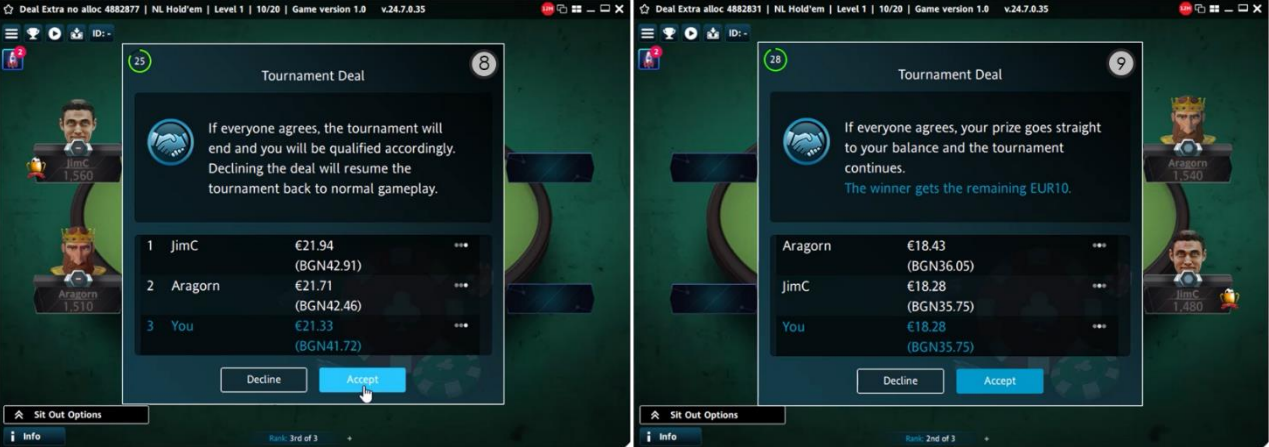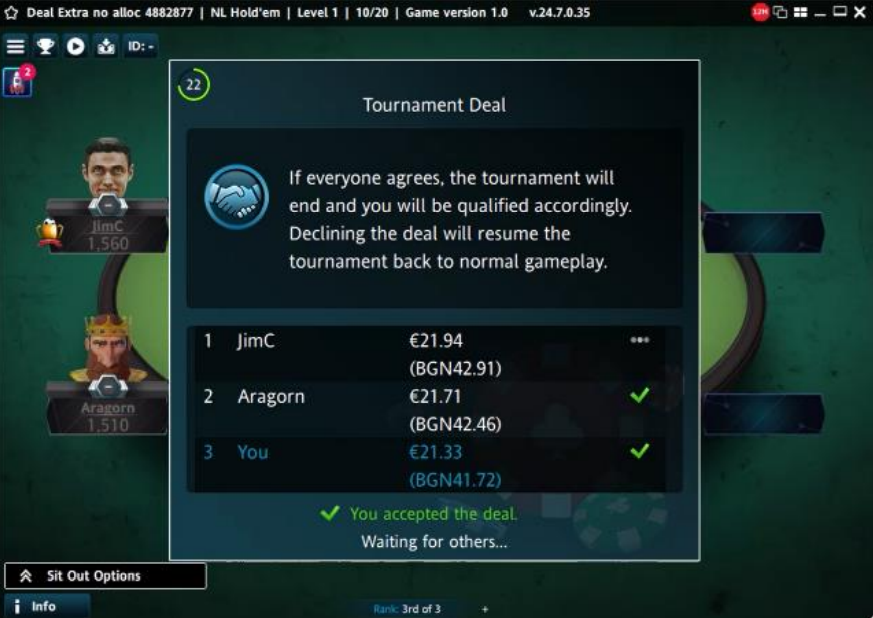Tournament Deals
The all-new Tournament Deals feature gives players the opportunity to conclude a deal in a multi-table tournament.
The players can make a deal when a multi-table tournament (MTT) set with cash prizes enters into the “Final Table” phase, and all players are in the money. The deal conditions (the prize the player will receive and the position on which the player will qualify) are calculated via the independent chip model (ICM) method.
Please note that:
- The Tournament Deals feature is available for all supported MTT variants set with cash/tournament money prizes, except for Satellites, Twister Arenas, Shootouts, and “Day 1” Flight events (the feature can be available in “Day 2” Flight events).
- The feature is also available for tournaments with extra prizes, given that all main prizes are cash or tournament money. The extra prizes are not considered for calculating the deals; however, they are granted to the players who qualify for the respective positions.
- The Mystery Bounty tournaments (“Day 2” events or single-day = Mystery Bounty tournaments) and KO/PKO tournaments continue after the deal regardless of the prize allocation type so that the bounties are distributed based on regular gameplay. Note that the bounties are not included in the tournament deal calculations.
- Only even chance prize allocation can be used for PKO tournaments.
When a player participates in a tournament with Tournament Deals, and all deal-making conditions are met (the players are playing on the final table and are in the money), the Tournament Deals widget icon appears on the table (1) to inform the player that the player can offer a deal to their opponents.
In case this is the first time the player is ever seeing the feature, the Tournament Deals widget expands automatically and shows the “Let’s make a deal!” checkbox (2). The info popup of the widget also expands automatically.
 |
If the player does not take any action after the widget has expanded automatically, the widget collapses after a few seconds.
When the player wants to offer a deal, the player should click/tap on the Tournament Deals icon to expand it (3) and then tick the “Let’s make a deal” checkbox (4). Upon doing so, the “Let’s make a deal!” text appears on the table next to the player offering the deal (5). In this way, the opponents get notified that a deal has been offered. The notification disappears after a few seconds.
 |
The tournament continues as usual until all players agree to discuss a deal. As soon as all players agree to make a deal (by expanding the widget and ticking the “Let’s make a deal!” checkbox), the players are notified that a deal will be discussed after the end of the current hand (6). The notification automatically collapses after a few seconds, and a tick sign appears over the Tournament Widget icon (7).
 |
When the hand ends, a popup with the deal conditions appears for all players, informing them:
- The amounts the players will receive.
- Whether the tournament ends or continues after the deal.
- The final positions of the players in case the tournament ends after the deal.
- The allocated prize for first place in case the tournament continues after the deal.
Example of a Tournament Deals popup for a tournament ending after the deal (8) as well as for a tournament continuing after the deal (9):
 |
All players must agree to the deal conditions (via the Accept button) for the deal to be made; otherwise, the tournament proceeds as usual. When a given player agrees to the offered deal a tick icon appears next to their name in the popup.
 |
When all players agree to make the deal, one of the following scenarios occurs:
1) The players receive their tournament deal prizes, and the tournament ends (a popup for this case is shown in image 8). The entire prize pool is distributed during the deal; there is no allocated prize for the first place. The players do not receive any other prizes from the prize pool for their final ranking. The end of tournament message appears soon after the deal and notifies the players about their final position and the fact that their prize is won as a result of a deal.
 |
Example demonstrating the case when the tournament ends after the deal:
A tournament is set with the following prize structure: €60 for the winner, €30 for the player in 2nd position, €10 for the player in 3rd position. There is no allocated prize for the winner.
Three players remain in the tournament and agree to conclude a deal. At the moment of the deal, Player A is left with 700 chips, Player B has 1500 chips, and Player C is left with 2000 chips. The ICM method calculates the deal prizes and determines the final positions of the players based on their current chip stacks and the tournament rewards set for 1st, 2nd, and 3rd places. Based on the just-mentioned criteria:
- Player C qualifies on 1st place and receives €41 from the deal.
- Player B qualifies on 2nd place and takes €35,78 as deal reward.
- Player A qualifies 3rd and is awarded with €23,22 from the deal.
The distributed rewards sum up to a total of €100, which is the entire available prize pool amount of the tournament at the moment of the deal.
2) The players receive their tournament deal prizes, and the tournament continues because part of the prize pool is allocated for the first place (a popup for this case is shown in image 9). In other words, during the deal, the ICM method calculates the prizes from the prize pool part, which is not saved for the tournament winner. Then, after the deal, the players play for the prize allocated for 1st place. The tournament winner receives the allocated prize for 1st place as well as the prize from the deal.
The end of tournament message shows the player’s final position, the prize won from the deal, as well as the prize for first place if the player wins the tournament.
Example showing the end of tournament message for the tournament winner:
 |
Keep in mind: the ICM calculation method (and respectively, the tournament deal prizes) depends on the available tournament prizes. Since there is a prize allocated for the winner, the set tournament prizes change according to the specified allocation method – ICM allocation method or even chance allocation method.
- ICM allocation method – the amount for the winner is collected from the reward set for first place.
- Even chance allocation method – the amount for the winner is taken proportionally from all available prizes. The calculation is done as follows: “(1st place tournament reward/sum of rewards)*amount allocated for first place”.
Example demonstrating the case when the tournament continues after the deal:
A tournament is set with the following prize structure: €60 for the winner, €30 for the player in 2nd position, €10 for the player in 3rd position. This makes up for a total prize pool of €100. €30 out of the total prize pool is allocated to the tournament winner. Three players remain in the tournament and agree to conclude a deal. At the moment of the deal, Player A is left with 700 chips, Player B has 1500 chips, and Player C is left with 2000 chips.
The ICM method calculates the deal prizes based on their current chip stacks and the tournament rewards set for 1st, 2nd, and 3rd places. Since there is a €30 allocated prize for the winner, the ICM method uses the remaining €70 prize pool to calculate the deal prizes.
The tournament deal prizes will differ depending on the method used to collect the €30 prize for the winner, as the different allocation methods will produce different tournament prizes for 1st, 2nd, and 3rd places.
| ICM allocation method | Even chance allocation method |
|---|---|
| If the ICM allocation method is used, then the system will take the €30 allocated for the winner from the €60 tournament prize set for the first place.
Therefore, the new prize structure in this case will be:
|
If the even chance allocation method is used, then the system takes a proportional amount from each available prize to collect the €30 prize for the winner. In this case, the tournament prize structure becomes:
|
| The total amount of the granted deal rewards in both cases of prize allocation is €70, which is the exact amount available for tournament deal rewards when we subtract the reward allocated for the winner. | |
| The tournament continues after the deal, and the players play for the chance to win the remaining €30 allocated for the winner. At the end of the tournament, the winner takes the €30 prize and the amount won from the deal.
Let’s suppose that Player A wins the tournament.
| |
- If a tournament has extra prizes, those extra prizes are not part of the deal or of the ICM calculation. The prizes are distributed as always – based on the finishing position of the player, regardless of whether a deal took place.
- If there are observers on the table while a deal is being made, a message informs the observers about what is happening.
- The Hand History allows the players to quickly distinguish the tournaments that ended with a deal thanks to the “Deal Made” text that appears next to the finishing position of the player.
The Tournament Deals functionality is available in all clients (Download Desktop, Android Mobile, and Web clients)













